- Home
- Cherie Priest
The Agony House Page 2
The Agony House Read online
Page 2
This was her life now.
She took a deep breath and twisted the knob on the next door down the line, hoping for something less awful than wasps but not counting on it. She pushed the door open. Pleasantly surprised for once, she let the breath out slow. This room was by far the largest—even bigger than the downstairs master—and it had an oversized window like the ones in the dining room, plus an old brown ceiling fan that looked like it might actually work. But when she flipped the switch on the wall, nothing happened.
“Oh yeah, the power’s not working up here,” she reminded herself.
Up here, the walls were a light sky blue, and most of the paint wasn’t even bubbled up with moisture. The floor was beat all to hell, but there weren’t any holes or suspicious stains. Sure, the corners were full of dust bunnies, the bottom right windowpane was cracked, and the tiny closet didn’t even have a door … but there was plenty of space and a window bench to boot.
Window benches were kind of neat, and she’d take dust bunnies over wasps any day of the week.
Back in the hall, the fan rattled away. Denise retrieved it, and hauled it toward her grudgingly chosen base of operations—but the extension cord stopped about three feet outside the door. She dropped the fan beside her foot and aimed it toward her bedroom.
She left it there, and went to check out the floor’s lone bathroom.
All things considered, it could’ve been worse. There was a claw-foot tub, and that was pretty cool. The sink was all right too—a pedestal with old-fashioned hot and cold knobs, so you could have one or the other, but not both at the same time. When she turned the cold knob, it even spit out water that looked like water, and not like chicken soup. The tiles on the walls were minty green with black accents. Hardly any of them were chipped or broken. A bottle of half-empty liquid hand soap was perched on the sink’s edge. It smelled like gardenias.
So far, the bathroom was the real highlight of the tour.
One more door to check, and her survey of the house would be complete. This last door was too narrow by half, and too tall by a foot. The knob was small and weird, and the twisty bit of hardware beneath it turned out to be a dead bolt. The screw turned reluctantly, with a grinding protest. The knob turned too, though it moaned like it would have preferred not to.
The door opened.
A dank gust of hot air belched into the hall. It tousled her hair and curled into her ears, wrapped itself about her waist, and felt around her calves. It tickled the sweaty places between her toes.
She sneezed and blinked hard, then sneezed again. She’d turned something loose into the house, and it wasn’t just air—it was powder-fine dust, and particles of mold, and the odor of something that once must have been unbearable … and now was merely unpleasant.
The dust and the accompanying stench settled down the steps and pooled around her ankles. It slipped away; it dissipated down the hall, into the bedrooms and the bathroom. But it never quite left. It lingered and stank.
The grimy air made her face feel dirty, but she squinted through it anyway. Through the gloom, she saw a staircase so thin that she’d nearly have to turn sideways to climb it—and she was on the small side of petite. Always the littlest one in every grade. Always last-picked for kickball … but first-picked for gymnastics. You’d practically have to be a gymnast to navigate those oddball stairs without breaking your neck. She quietly thanked all those lessons, and all those trips to the top of the pyramid. Maybe they would come in handy after all.
“So … this must be the attic.” Another sneeze escaped, before she could cover her mouth and nose. She wiped them both on the back of her hand, then wiped her hand on her shorts and stared at the steps.
The attic door moved.
Denise jumped back.
Maybe it had drifted in the breeze, or drooped on its hinges, or performed some other trick of very old hardware in an uneven house—but it had moved. All by itself.
Denise smacked the door shut. It rattled in the frame and a couple of rusty old nails rolled loose, away from the threshold.
She stood there in the hall, staring at the door and hoping her heart wouldn’t pound right out of her chest. The house settled, and somewhere far away a board stretched, squeaked, and went silent. She held very still and listened, but heard only the dull roar of the box fan a few yards away. She listened harder, and heard another buzz that might’ve been the wasps in that other bedroom, or it might’ve been some other big bug brought around by the river mud and the late summer heat.
Firmly, but softly—like she didn’t really want an answer—Denise asked: “Is someone inside the house here with me?” But she didn’t believe the silence, so she tried again. “Am I really alone in here?”
Behind the attic door something moved, just loud enough to be felt.
Never mind the gymnastics lessons or her spirit of adventure: The attic could wait.
Quickly, she sprinted back down the hall to her bedroom. She stood in the middle and stared at the box fan, which didn’t quite reach inside. Its motor turned with a crunch like a coffee grinder, and its blades did that funny thing where they made every noise sound warped and low, like it came from someplace far away. It was an illusion. It had to be, the way the fan blades were spitting out vowels, wide and loud. The way they were spitting out words.
Her chest was tight. Her heart stuttered. And she almost jumped out of her skin when she heard her mom’s car pull off the road and up next to the house.
She darted to the window and looked down at the “off-street parking” the real estate listing had mentioned. It was only a space beside the house where nothing was built and nothing was growing, but it was big enough for Sally’s old light blue Kia to camp with room to spare.
The car doors opened. Sally and Mike stepped out. And Denise could breathe again, even if she hadn’t forgotten the attic door, or the smell, or the sound of something moving just out of sight. She couldn’t forget any of that, but she could push it out of her head for a few minutes—because Sally was carrying three bags of Dairy Queen takeout and Mike was holding a cardboard beverage tray with three sodas wedged tightly in its grip.
So maybe the house was gross, and maybe it was practically condemned, and real talk? It was definitely haunted. Maybe Denise didn’t have any friends at all within three hundred miles, and maybe she’d have to start school in September at a place where no one knew her name, and no one had her cell number. The situation was bad. Real bad. Wasps-in-the-bedroom bad. Crying-when-nobody’s-looking bad.
But it wasn’t the end of the world, because there was ice cream. It was the thinnest of all possible silver linings, but if there was chocolate fudge on it, Denise would take it.
And to hell with whatever was hiding in the attic.
The next day was a whirlwind of housework and unpacking, of breaking down the free liquor store boxes they’d used, and bagging up the newspaper that had wrapped the plates and glasses. By Sunday evening, the place was almost clean … for a relative value of clean. A vacuum cleaner and a dustrag couldn’t do much about a hole in a wall or missing floorboards, or the wires that hung loose in their frayed cloth wrappings. But they could clear out the cobwebs and the dust bunnies, and make the place feel a little less abandoned.
Still, there was always more work to be done. On Monday morning, Sally said merrily, “If you’ve got time to lean, you’ve got time to clean!”
“Kill me now.”
“Oh, come on. It isn’t that bad,” she promised. “We’re making real headway, here!”
“On what?” Denise asked miserably.
Mike replied, “Getting ready for the big stuff. The electrician and plumber will come around later this week, but nobody’s gonna be taking down walls or anything. We’re only planning a little bit of demolition, and that’ll be fun. Picture it: pulling down cabinets, whacking stuff with a sledgehammer … it’s always more fun to break things than build things.”
“Says you.”
“You’ll be saying it too
, soon enough. I bet you a trip to Dairy Queen.”
“Now you’ve got my attention.”
He laughed. “Good, because after breakfast … you can come with me to the hardware store down the street. We need a few things before we get started.”
“All right. Anything that’ll get me out of the house, and I’ve got a shopping list anyway. I think we need some light bulbs.”
Mike couldn’t have agreed more. “You’re not kidding. Last night we were down to two bulbs down here on the first floor, and we had to move them around from room to room. I burned my finger on one.”
“Very dignified.”
“Don’t I know it. Your old man is a real class act.”
She was still getting used to hearing Mike talk like that, calling himself her dad—even in a roundabout way. Sometimes he referred to her in passing as his daughter, and that felt strange too. Not bad-strange, just … awkward. Even though he tried to make it as not-awkward as he could. Before the wedding, he’d gone out of his way to ask if it was okay and she’d given him the green light. Why not? It made her mother happy, and the more Denise thought about it, the more she didn’t honestly care, one way or the other.
The truth was, she didn’t remember her real dad. He was just a smiling man in someone else’s memory, a grainy figure in other people’s photos. Shorter and heavier than Mike, Billy Farber had been pale as a cave fish, with sharp cheekbones and kind eyes. If Sally could be believed, he was a Saints fan and a dog-lover—a fisherman when money was low, and a street market warrior when it wasn’t. If the surviving pictures could be trusted, he was a mean cook who hosted the block’s best shrimp boils. He was also a middling musician who never quite got the hang of playing bass, but enjoyed it anyway.
Then the Storm came, and the water took him. It wasn’t Billy’s fault that Denise hardly remembered him, and didn’t love him. She just never got a chance to know him.
Now there was Mike Cooper, and Mike was pretty all right. He could call her his daughter if he wanted to, and she hoped her bio-dad—up in heaven, or wherever—wouldn’t hold it against either one of them. If he was as nice as everybody always said he was, then he probably thought it was cool.
But it still felt weird.
When the remains of breakfast had been washed up or stored, Sally wished Mike and Denise good luck and said she’d stay there and wait for the city to deliver the dumpster.
“We get our own dumpster?”
“We’re going to pull a lot of garbage out of this house, and it won’t all fit in the bin that goes to the curb. The guy at the office said they’d bring a big one around between eight and nine, so … you two have fun. I’ll stick around and sign for it, or whatever they want me to do.”
Denise had her doubts about “fun,” but she said good-bye and climbed into the Kia’s passenger seat.
Mike got behind the wheel. “The hardware place is only a few blocks away. If I wasn’t planning to buy stuff, I would’ve just walked.”
She nodded approvingly. “I appreciate your laziness, good sir.”
“I’m not that lazy, but it’s awful damn hot.”
A minute or two later they drove past a two-story building that looked brand spanking new. The sign outside read RUDY LOMBARD HIGH SCHOOL. The parking lot was big and empty, and a cluster of buses were lined up beside it—silent and still.
She didn’t remember doing it, but she must’ve sighed and her stepdad must’ve heard her, because he said, “Don’t be so dramatic. It looks nice. It’ll be a good place to spend your senior year.”
“Maybe, but I was really looking forward to not being the new kid, for once.”
Mike shrugged. “That school’s only been open for a year or two. Everybody’s a new kid.”
“But they’re all from the same neighborhood. They all know each other already.”
He didn’t have an answer for that, but Pete’s Notions and Hardware appeared around the corner, so he didn’t need one. “Hey look. We’re here.”
“What’s a notion?”
He pulled into a space and they both climbed out. “I think it’s just another word for ‘stuff.’ ”
It hadn’t been five minutes, but Denise was pretty confident that it was already hotter outside than it’d been when they left the house. She wiped her forehead and looked around: Pete’s had an empty lot on either side of it, and a gas station across the street. Both the store and the gas station looked like they’d weathered the Storm with only marginally better success than the Agony House, but there were two older black men on the front porch of the store, sipping beers and chatting about the fat old dog that lounged at one man’s feet. It looked like a friendly enough spot, and through the glass front door she spied the glowing red light of a Coke machine.
Mike saw it too, and he knew who he was dealing with. He pulled out his wallet and gave Denise a couple of bucks. “Go get yourself a Coke, if you want. I won’t be long, because my shopping list ain’t.”
“Cool, thanks. But you added light bulbs, right?”
“Top of the page, yes ma’am.”
The AC inside the store wasn’t a whole lot better than the one inside her house, but at least there was shade. The shelves were stacked high, and everything was crowded on top of everything else. It looked like Mike was right about “notions,” because from where Denise was standing, it meant “any kind of junk or stuff that doesn’t fit the description of hardware.” She saw everything from pet food to suncatchers, bug spray to canned beans.
She homed in on the soda machine, a moth drawn to the lit-up logo.
She needed a dollar fifty to get the bottle of her choice. The first bill went into the slot just fine, but the second one was wrinkled. She straightened it on the machine’s corner and tried it again. No dice.
“You want to trade?”
She stopped wrestling with the dollar, and turned around. Behind her, a black guy about her own age was holding out a crisper bill than the one that came from Mike’s sweat-dampened wallet.
“Um … sure. Thanks.”
They switched money, and the new bill went into the feeder just fine. Denise pushed the button for a Diet Dr. Pepper, and listened to the internal mechanisms spin up the selection. “Right on,” she said. “Seriously, I appreciate it.”
“No problem. And I’m Norman, just so you know.”
She tried not to frown quizzically at him, but mostly failed. “Norman?” She’d never heard of a guy under the age of eighty named Norman before, but there was a first time for everything. He was beefy, like he probably knew his way around some of Pete’s power tools. Maybe he worked construction in the summers. Back in Texas, she’d known a lot of guys who did that. They always came back to school in the fall looking like linebackers. He had buzzed hair and hazel eyes, and dark skin that showed a little tan line around a bead bracelet on his left wrist. “You don’t look like a Norman.”
“I was named after an aunt.”
“Aunt Norma?”
He grinned. “Got it in one. And what’s a Norman supposed to look like?”
She didn’t know. “Sorry, that was a dumb thing to say.”
“Don’t worry about it. I’ve heard a lot worse. Are you new here? Haven’t seen you around before.”
“Um … I’m from here … but my mom and I left when the Storm hit. We ended up in Houston, and now …” She half shrugged, half gestured around at the store. At the whole neighborhood. “Now we’re back.”
“Welcome back, then.”
“Thanks. It’s been an adventure.”
He leaned against the Coke machine. She noticed a camera hanging off a strap on his left side. “Good adventure, or bad adventure?”
“Let me put it this way: The house my parents bought is a total wreck. It’s practically condemned.”
He laughed. “We got a lot of wrecks around here. Wrecks, and a few houses that are so nice, nobody can afford them. But mostly wrecks.”
She sighed. “Yeah, we can’t afford the n
ice ones, so we’ve settled for a crappy one. Maybe if we’re lucky, someday we’ll be able to make it nice. But between you and me, I’m not holding my breath.”
“Aw, come on. With a little time and money, you can fix practically anything,” he protested. “There’s life in the neighborhood yet, you’ll see.”
“I believe you, but this house is going to take a lot more than a little time and a little money. If we had a dump truck full of both, I’m not sure we could save it.” She paused, suddenly afraid that she was being insulting. This guy obviously lived here. She didn’t want to dump all over his home turf. She backpedaled a little. “We’ll do our best, but I don’t know.”
Mike came around the corner pushing a rusty half-sized shopping cart. It was loaded up with extension cords, a massive bargain-sized box of trash bags, a roll of plumber’s tape, two big bundles of rags, a pair of scrapers, and five or six boxes of light bulbs. “Hey girl, you ready?”
“That was fast.” She reached into the bottom tray and picked up her cold bottle of soda.
Mike glanced at Norman, nodded, and turned the cart toward the counter.
“I’m right behind you,” she promised him. Then she told Norman, “That’s my stepdad.”
“He looks … ready to light up half of New Orleans. How big is your house, that you need so many bulbs?”
“Kind of big,” she admitted. Then she inserted herself into Mike’s sad story about the burned finger. “And we only have, like, two bulbs that actually work. We were moving one of them around last night, from room to room.”
Norman shook his head sadly. “That is just freakin’ tragic.”
She snorted a small laugh, right out her nose. “Like I said, we’ve got a lot of work to do.”
“Anyway, it was nice to meet you … ?”
“Denise. Sorry. I’m Denise.”
“All right, Denise. Catch you around.”
“Yeah, it was nice to um … to meet you too. You’re the first person I’ve met, actually. Since we got here.” Did she sound weird? She thought she sounded weird.
“Cool. Do I win a prize?”

 Maplecroft
Maplecroft Chapelwood
Chapelwood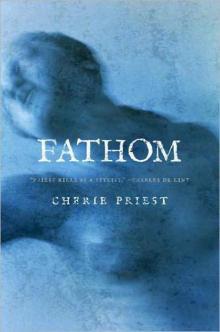 Fathom
Fathom Hellbent
Hellbent Jacaranda
Jacaranda Four and Twenty Blackbirds
Four and Twenty Blackbirds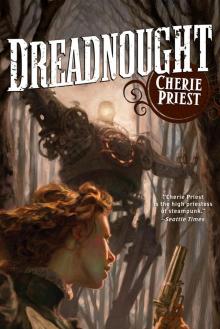 Dreadnought
Dreadnought Dreadful Skin
Dreadful Skin Bloodshot
Bloodshot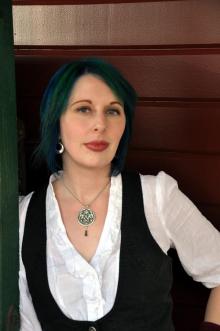 Tanglefoot
Tanglefoot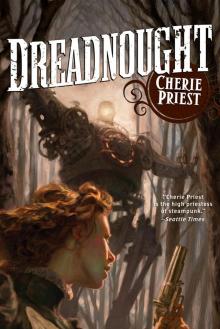 Clementine
Clementine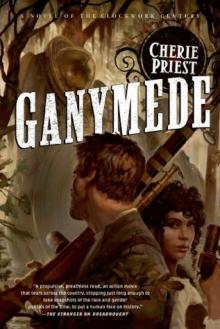 Ganymede
Ganymede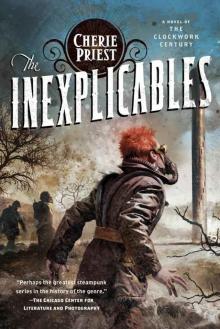 The Inexplicables
The Inexplicables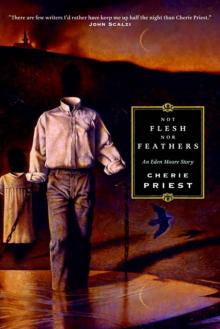 Not Flesh Nor Feathers
Not Flesh Nor Feathers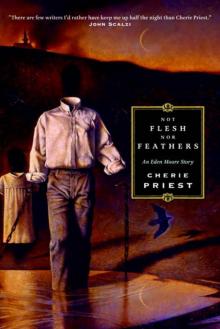 Wings to the Kingdom
Wings to the Kingdom Fiddlehead
Fiddlehead Tanglefoot: A Story of the Clockwork Century
Tanglefoot: A Story of the Clockwork Century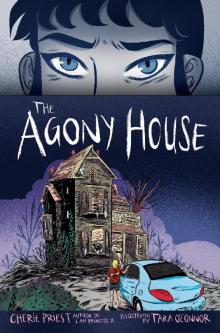 The Agony House
The Agony House Ganymede (Clockwork Century)
Ganymede (Clockwork Century) The Inexplicables (Clockwork Century)
The Inexplicables (Clockwork Century)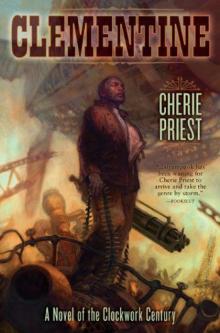 Clementine tcc-2
Clementine tcc-2 Grants Pass
Grants Pass Dreadnought tcc-3
Dreadnought tcc-3 Ganymede tcc-4
Ganymede tcc-4